A Message from OUr Executive Director
2021 was certainly another challenging year of ongoing adjustments to the COVID-19 pandemic, but together we’ve continued to advance our vision of a world where communities, nature, and people all thrive together. I’m proud of our team’s dedicated commitment and outstanding work to further our mission. When I first started at Earth Economics 16 years ago as an intern, we were four people in a coffee shop working to introduce ecosystem services and natural capital into the conversation–concepts that were barely recognized at the time. Now, with broader recognition firmly established, we’re focused on incorporating natural capital values into decisions.
I’m honored to lead a team of talented and dedicated researchers, analysts, and support staff who are driving smart decisions in business and government by providing robust, cutting-edge research on the most innovative solutions to our pressing problems. I encourage you to get to know our staff down below in the “Words from Our Team” section.
Since 2020, the goals below have guided our efforts, and 2021 saw significant strides toward this vision. You’ll find more information in the “2021 Project Highlights” section of this report.
Resilient Communities: Build capacity for and accelerate investment in nature-based solutions, to build community resilience and equity.
This past year, we expanded our work with communities on the frontline of climate impacts, especially BIPOC communities across the nation. A particularly meaningful project for me, as the daughter of an immigrant and a refugee, was our partnership with World Relief Seattle. We assessed the value of their Paradise Parking Plots Community Gardens, a community hub for immigrant and refugee communities in Kent, WA.
Recreation Lands: Measure the economic contributions of recreation to reinforce the importance of natural lands to communities.
Public lands use has seen a significant uptick since the start of the pandemic that is expected to continue. In 2021, we pioneered an innovative new method using cell phone data to assess visitation. With a more granular level of data, we can provide land managers with much-needed information to support smart planning for recreation land management.
Working Lands: Management of ecosystems primarily for the production of food, fiber, and other products, with the goal of improved resilience.
We supported Agriculture Capital’s annual shareholder report, clarifying how increased soil organic matter supports water resilience. This exciting new area of research illuminates the dynamics of soil composition and its effects on water capture and carbon storage.
Sustainable Investing and Finance: To ensure natural capital assets and their benefits are addressed in accounting, investment, disclosure standards, and best practices.
We recognize that investors need robust data for their sustainability goals, and we are well-positioned to fill the data gap for environmental values of their portfolios. In 2021, we launched a partnership with Akiptan, a Community Development Finance institution that supports indigenous farmers in the U.S., with the aim of providing data that will attract impact investment funding to diversify their financial sources in support of Native American producers.
These goals will continue to guide our work in 2022 and beyond, and we will remain nimble, forward-thinking, and responsive to the times. We’re happy to keep doing what we do best: leveraging project-level successes to effect change through federal-level policy work, all while keeping our work grounded in the communities that are most directly impacted.
Maya Kocian
Executive Director
Our Approach
Awareness Raising
We help leaders and decision makers apply innovative data and tools to make financially and environmentally sustainable decisions.
Through hands-on workshops, training, and presentations, we build a deeper understanding of how to take nature into account when addressing critical challenges facing communities and businesses.
Place-Based Analysis
We identify, quantify, and value ecosystem services based on geospatial information and data from our Ecosystem Valuation Toolkit (EVToolkit), which includes the leading valuation database of ecosystem services worldwide.
By providing broader insight into return-on-investment and long-term sustainability, we support public agencies and private firms as they seek to reduce risk and expand job opportunities.
Decision Support
We provide expertise on financial and policy strategies to preserve, enhance, or restore natural capital assets.
Our data-driven approach provides focused information to support policy and investment decisions on nature-based solutions to human well-being and community resilience.
2021 Project Highlights
With increasing climate impacts–especially wildfires, floods, and urban heat island effects–we’ve delved deeper into analyses that show just how valuable and effective nature-based solutions can be. From assessing the economic impact of outdoor recreation in the Northwest to identifying the benefits of community-driven green infrastructure in New Orleans, our work addresses systemic challenges. Take a look at some of our most exciting work of 2021.
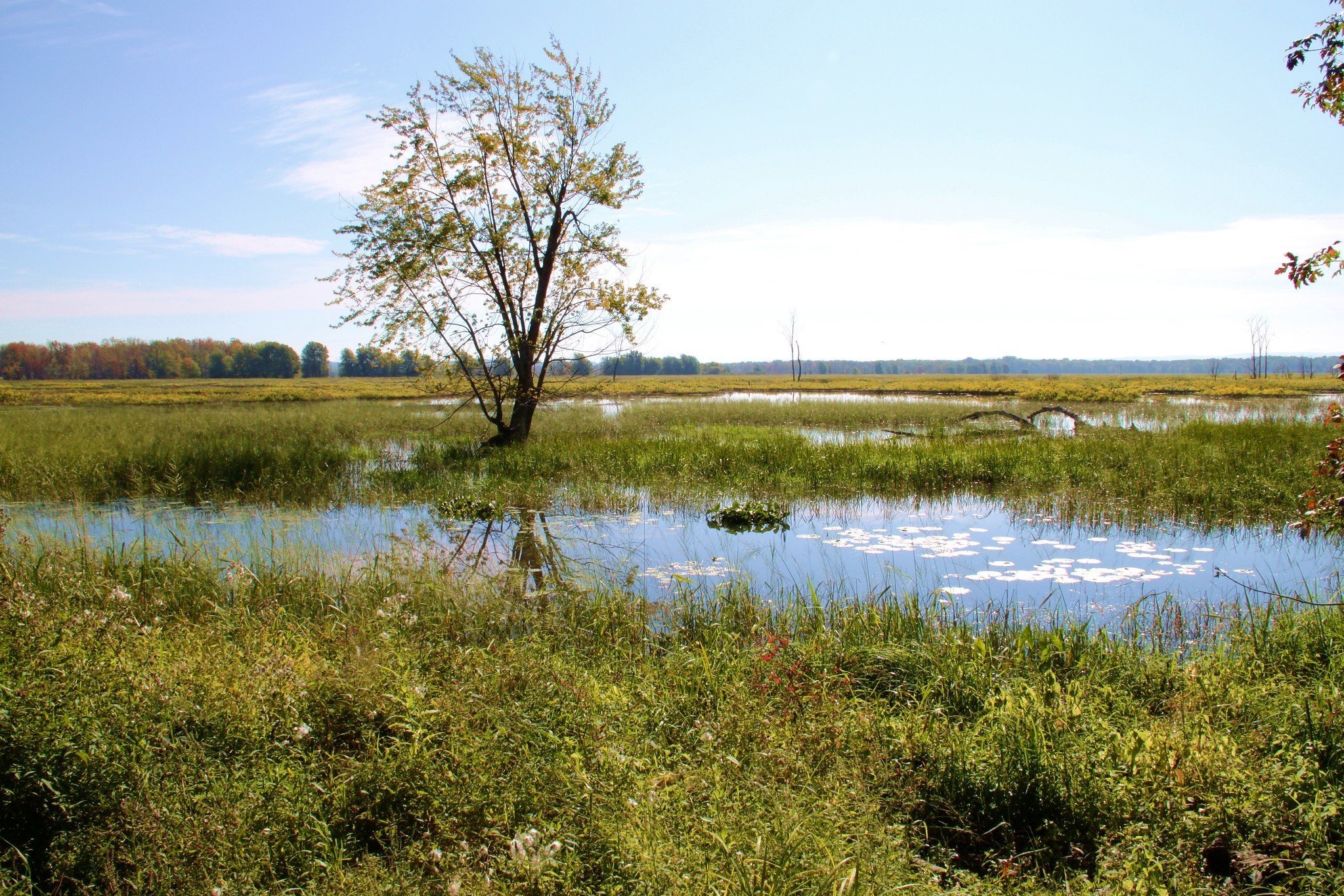
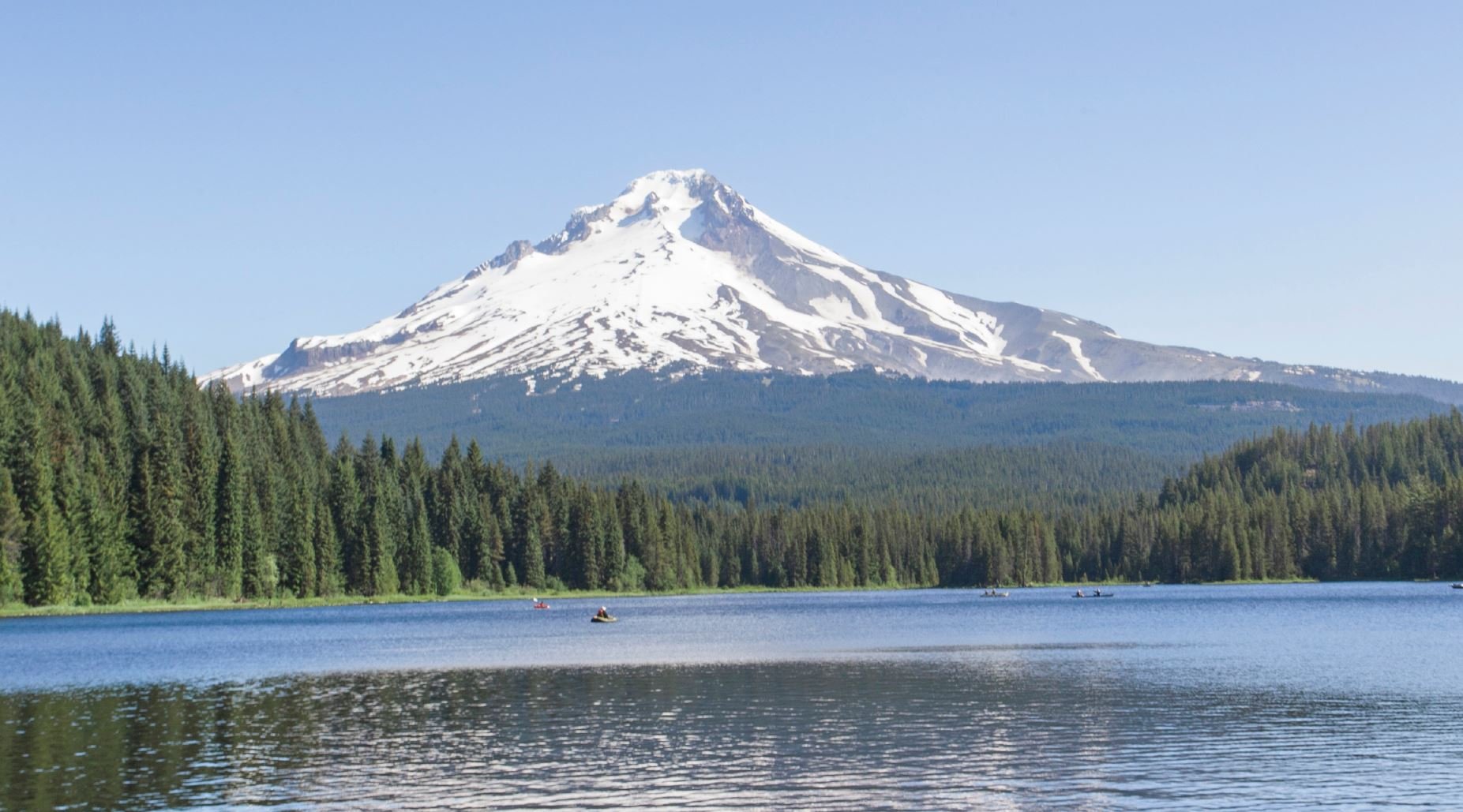
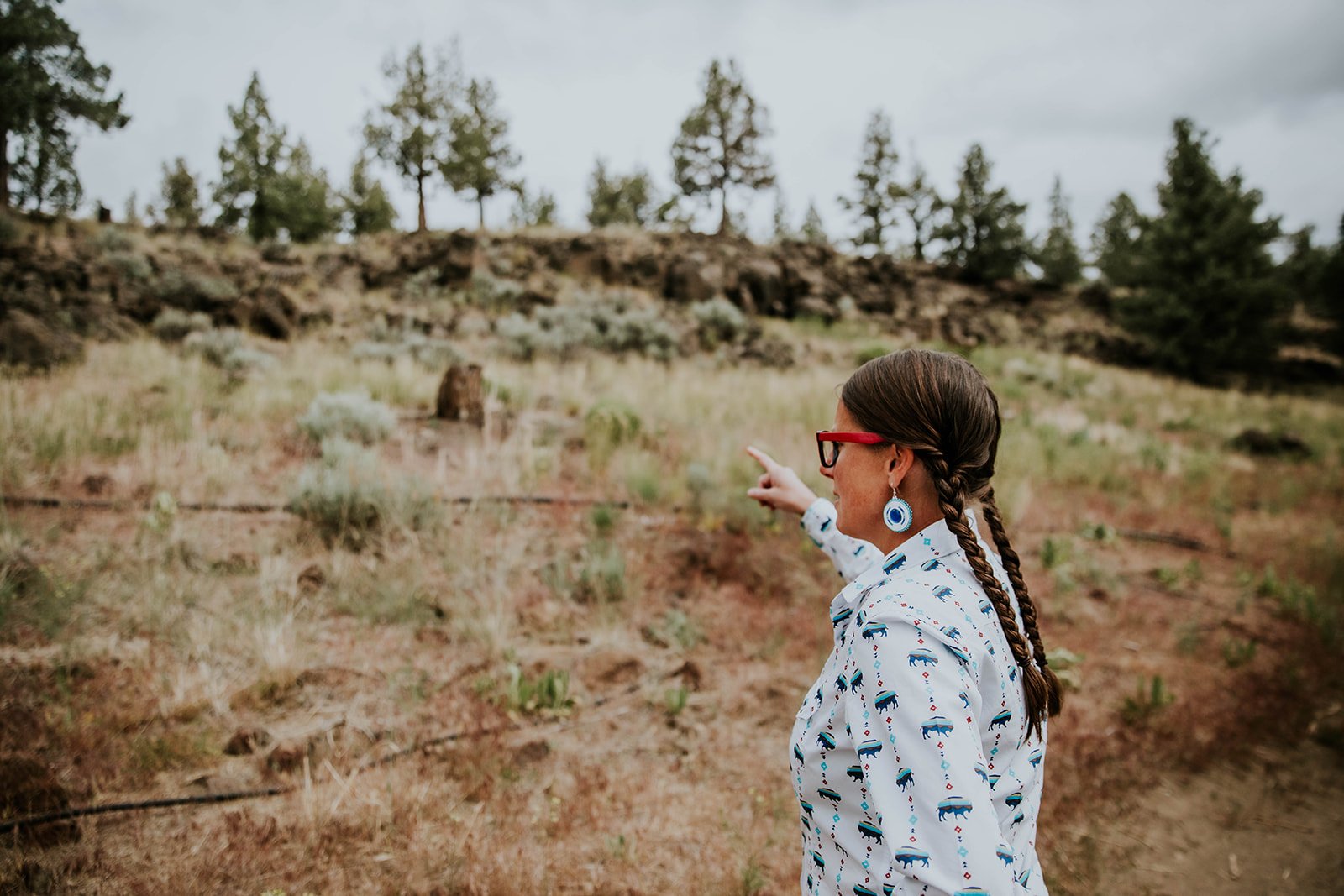


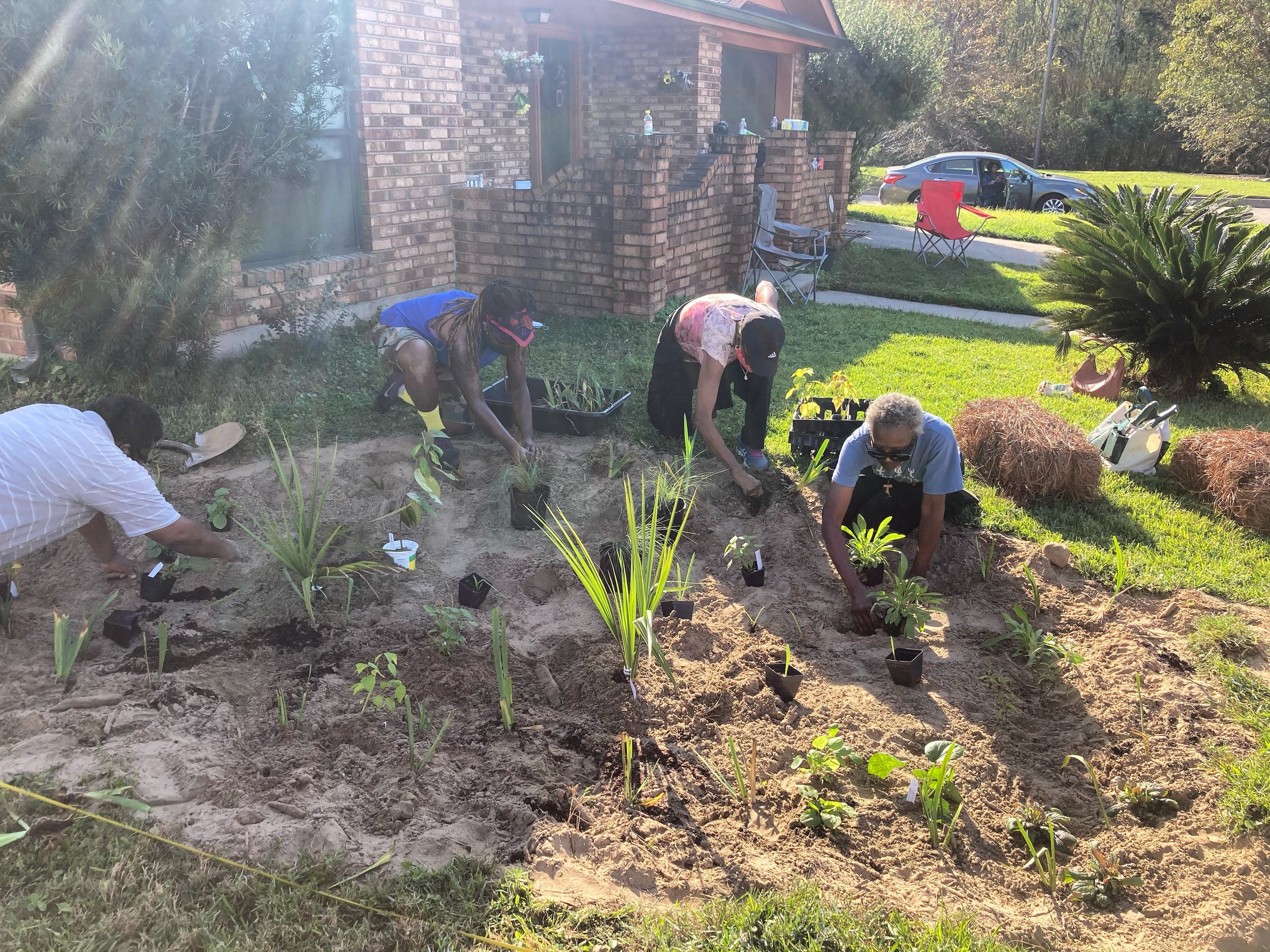
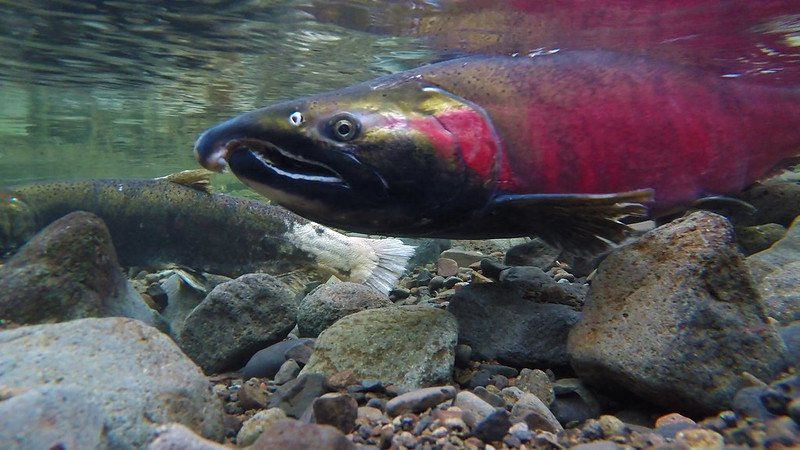

Where We Worked
New Tools and Resources
For over 20 years, we’ve been developing a robust suite of analytical tools for valuing nature. What began as a spreadsheet in 1998 has evolved into an ever-growing suite of tools for estimating the non-market value of ecosystem services, green infrastructure, and more. This year, we launched a new hub webpage for our tools, some of which are publically available like the Water Reuse Calculator in collaboration with the Seattle 2030 District. Check out our new page to learn more about the tools we use and how they can benefit local communities, commercial landowners, decision makers, and more.
“The EVToolkit paves the way for improving public and private investment, realigning economic incentives towards ecological and financial sustainability, and shifting or creating markets to solve some of humanity’s most pressing problems.”
| Tool Name | Coverage | Use/Purpose/Value |
|---|---|---|
| SERVES | Worldwide | A proprietary database of ecosystem service values to support Benefit Transfer calculations at all spatial resolutions, with global coverage but an emphasis on North America. |
| Seattle Water Reuse Calculator | Local | Facilitates benefit-cost analysis of rainwater harvesting and reuse by providing initial analyses to kickstart project feasibility studies. |
| Water Infrastructure Jobs Calculator | United States | Estimates the jobs created per every $1M invested in sustainable, local water infrastructure solutions. |
Next Up in Research
SUSTAINABLE INVESTING & FINANCE
Social and impact investors seek to support green infrastructure projects with robust triple-bottom-line returns, yet reliable portfolio-level data on project costs and benefits is often lacking. We’re developing broad-based analytical tools to support investors and those tasked with implementing nature-based solutions.
WORKING LANDS
Agricultural and livestock management practices can have a big impact on ecosystems for good or bad, so we’re working to shift investment to sustainable practices. Building off of our previous research on US Department of Agriculture rangelands, we’re looking at an innovative new set of soil management techniques on rangelands in the West.
RECREATION LANDS
Our latest economic contribution analysis of Washington State’s outdoor recreation industry employs an exciting new methodology that’s promising for future research – using cellular data to better understand how recreationists engage with public lands and the local economies around them.
RESILIENT COMMUNITIES
Communities across the nation are recognizing the benefits of green infrastructure, and we’ve partnered with a forward-thinking coalition of communities of color to show the benefits of a proposed network of green infrastructure installations across historically black colleges and universities (HBCUs).
Board, Staff, and Special Contributors
Our dedicated and talented staff, interns, and Board of Directors are the backbone of all that we do at Earth Economics. We’re deeply grateful for and incredibly proud of the work of our small but mighty team. Their dedication, expertise, and collaboration are what enable us to make an impact in valuing nature.
Board of Directors
Morgan Collins
David Cosman
Judy I. Massong
Ali Modarres
Nan McKay
Craig Muska
Ingrid Rasch
Molly Seaverns
Interns
Tena Ward
Alex Trovillion
Chris Govella
Max Larkin
Helen McDonald
Jordan Buser
Katia Rar
Rachel Kadoshima
Staff
Maya Kocian, Executive Director
Rowan Schmidt, Program Director
Mark Holcomb, Operations Director
Angela Fletcher, Senior Researcher, Tools and Data Manager
Ken Cousins, Research Principal, Ecological Economist
Olivia Molden, Project Director
Johnny Mojica, Project Director
Erin Mackey, Project Director
Trygve Madsen, Communications Manager and Senior Research Analyst
Laura Villegas Ortiz, Senior Research Analyst
Will Golding, Research Analyst
Alice Lin, GIS Specialist
Jessica Hanson, Communications Specialist
Jean Jensen, Administration and Development Manager
Marvin Termin, Bookkeeper
A Letter from our Board Chair
Since moving to the Northwest in the 1970’s, I’ve focused my career on supporting local governments and nonprofits, developing policy and programs to promote local and regional sustainability, and leading work to protect and restore the Salish Sea. Twenty years ago, through my work at a foundation, I learned about Earth Economics and its exciting and valuable work. Four years ago, I was honored to be invited to join its Board of Directors.
I want to give special thanks to Ingrid Rasch who served as our Board Chair for 13 years, helping to set strategic direction and building the board. At the end of 2021, the Board of Directors created the Ingrid Rasch Legacy Fund. The Fund honors Ingrid’s values and practice of “strategic opportunism”. We hope it will spur innovative ideas and help grow the next generation of environmental stewards.
This report will give you a glimpse of some of the projects Earth Economics has tackled during the last year. We helped the Federal Emergency Management Agency develop nature-based solutions to reduce the risks of flooding, wildfire, and drought. We released a report on the Sociocultural Significance of Salmon for Tribes and First Nations for the Pacific Salmon Commission. This report is a look back. But all of our accomplishments are an investment in our future, the future of our “places”, and our world. We hope the report whets your appetite to learn more about our work.
Nan McKay
Chair, Board of Directors
Words from our Team
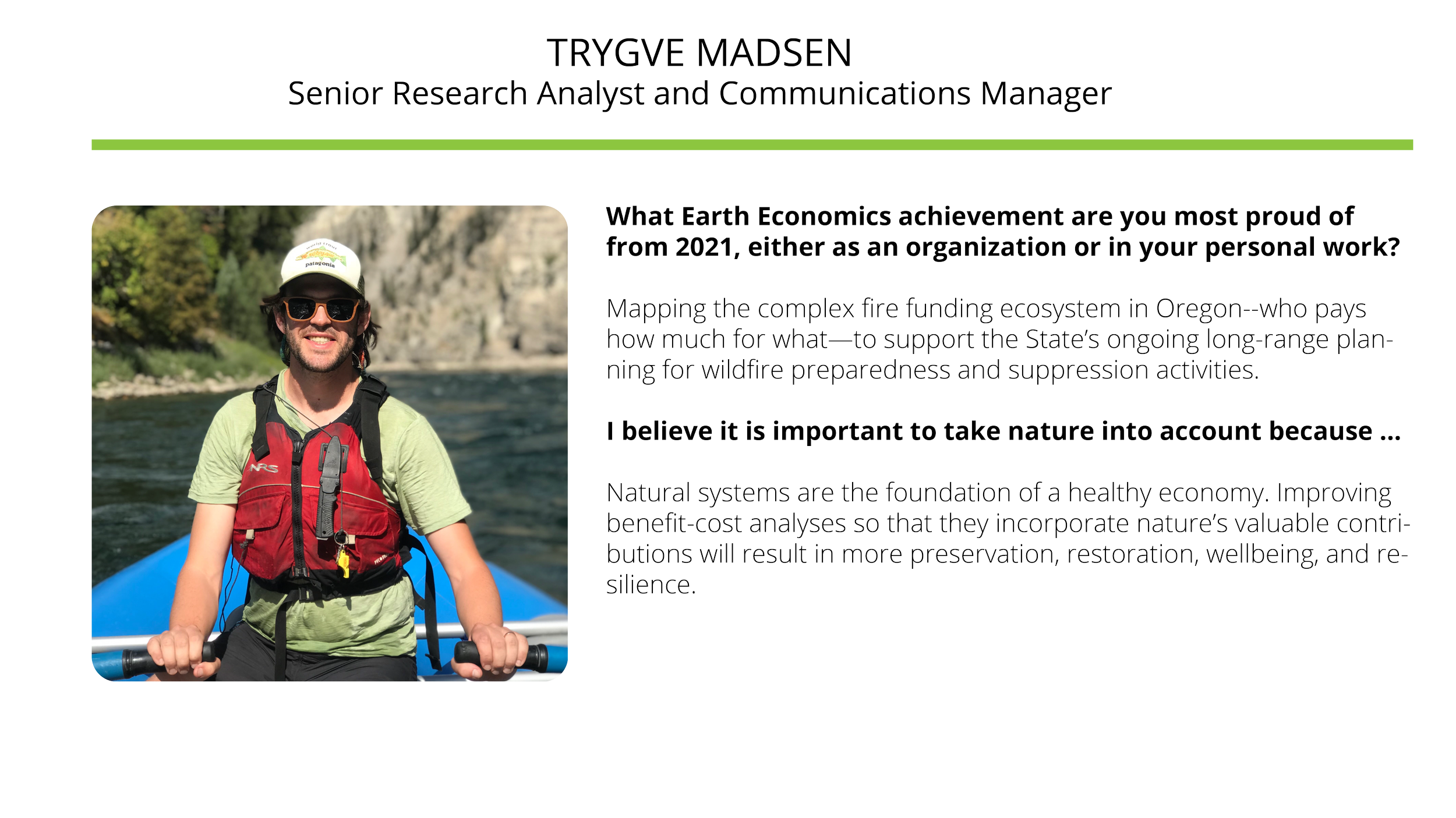
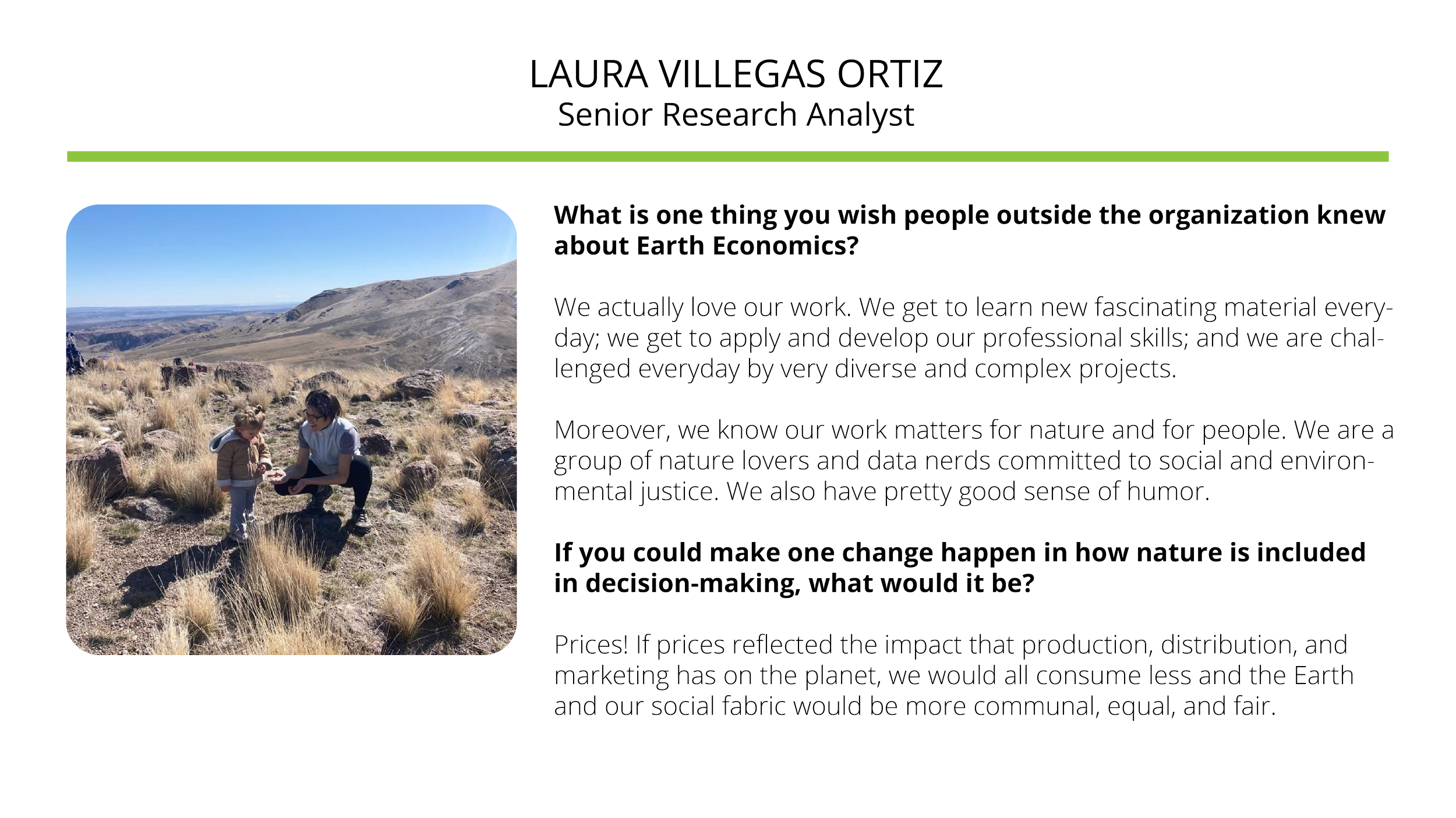
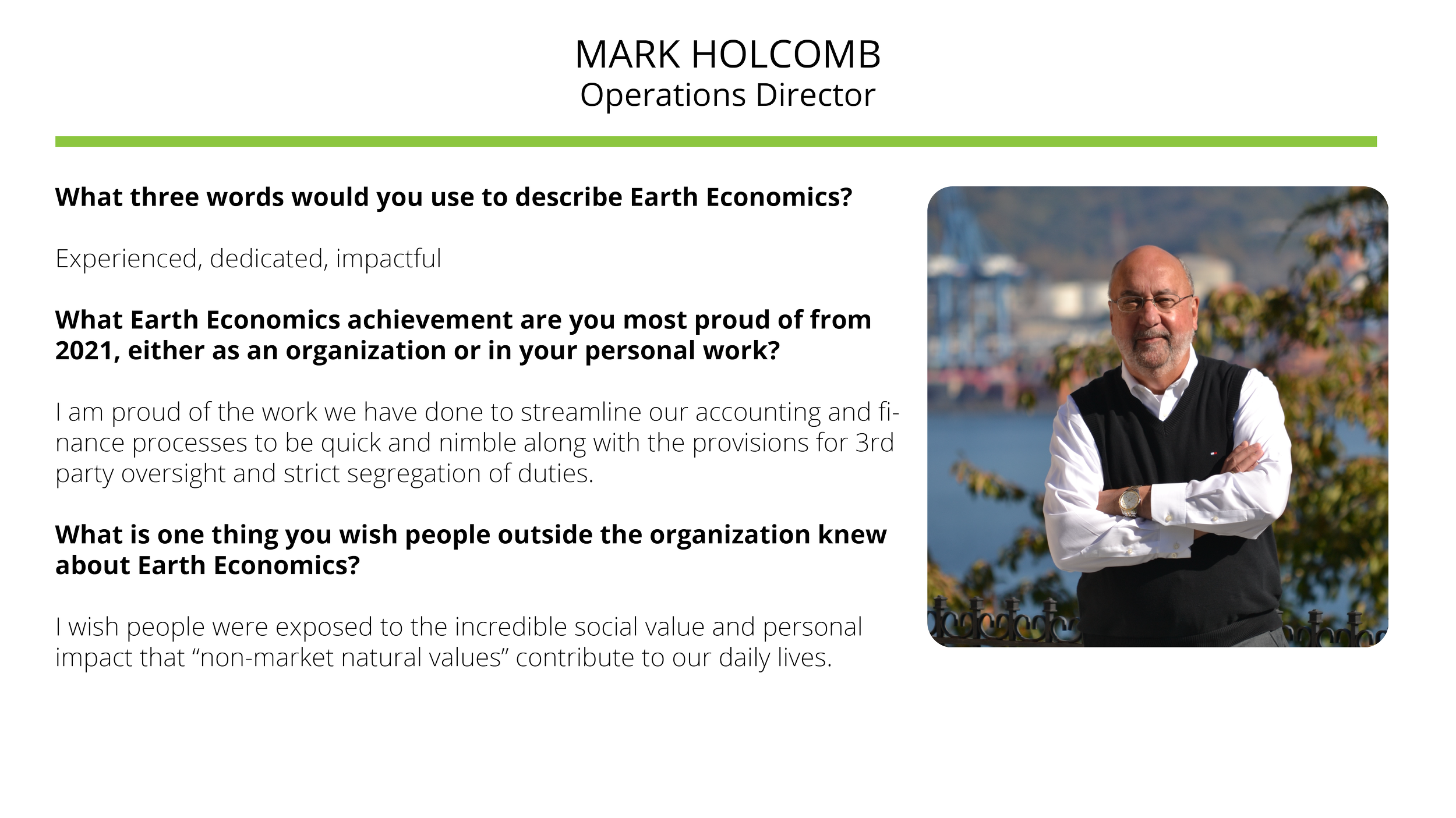
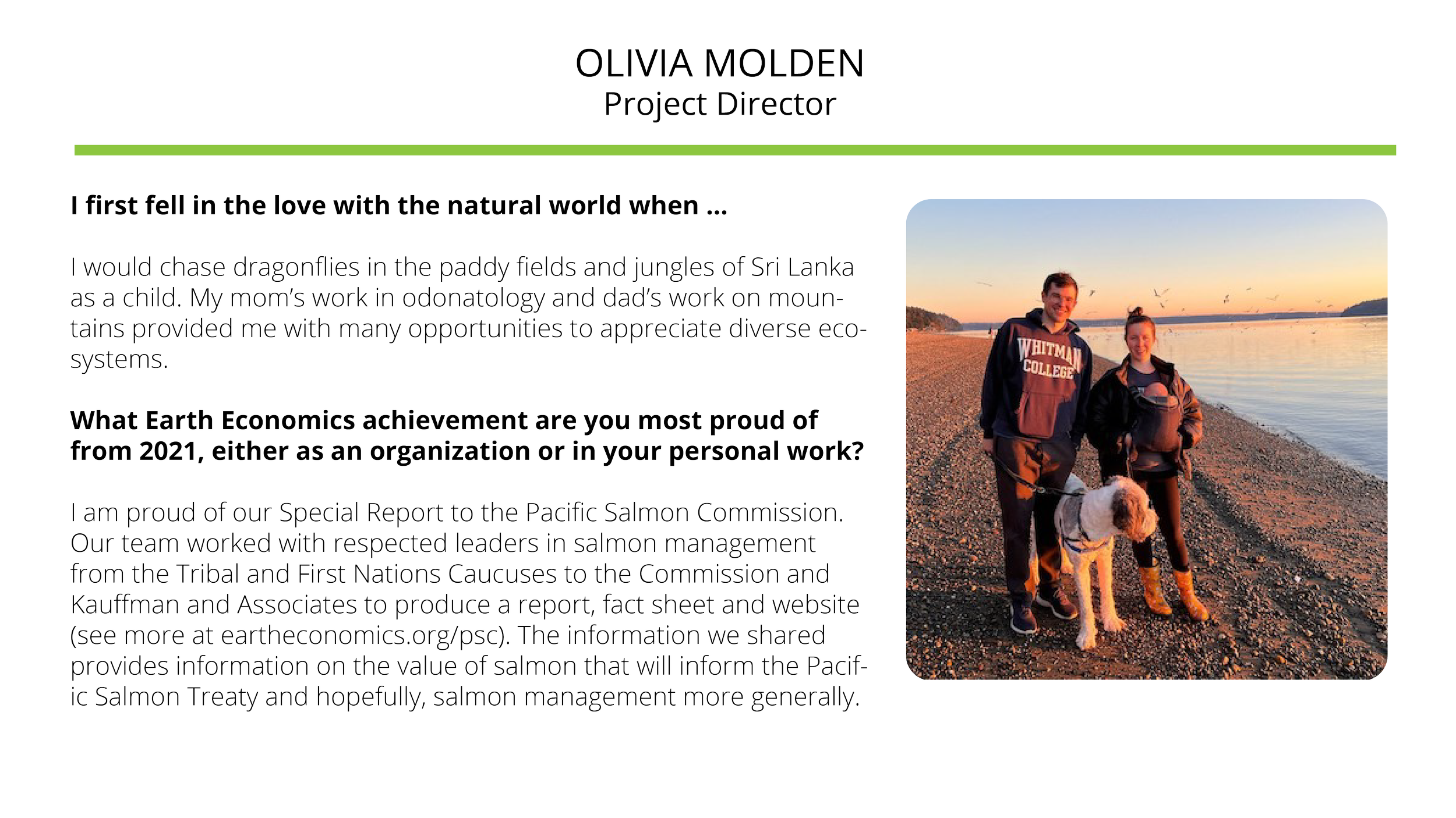
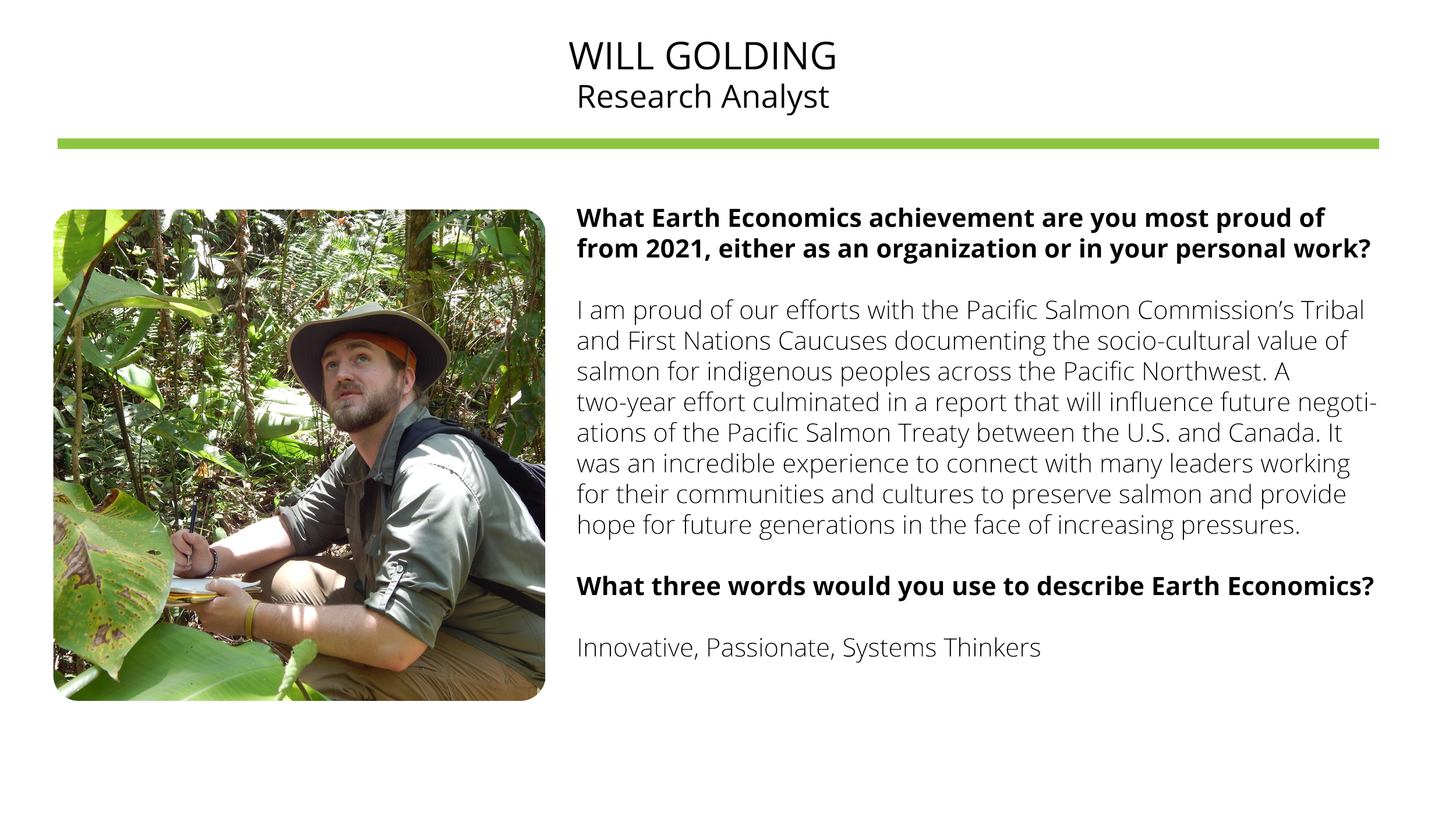
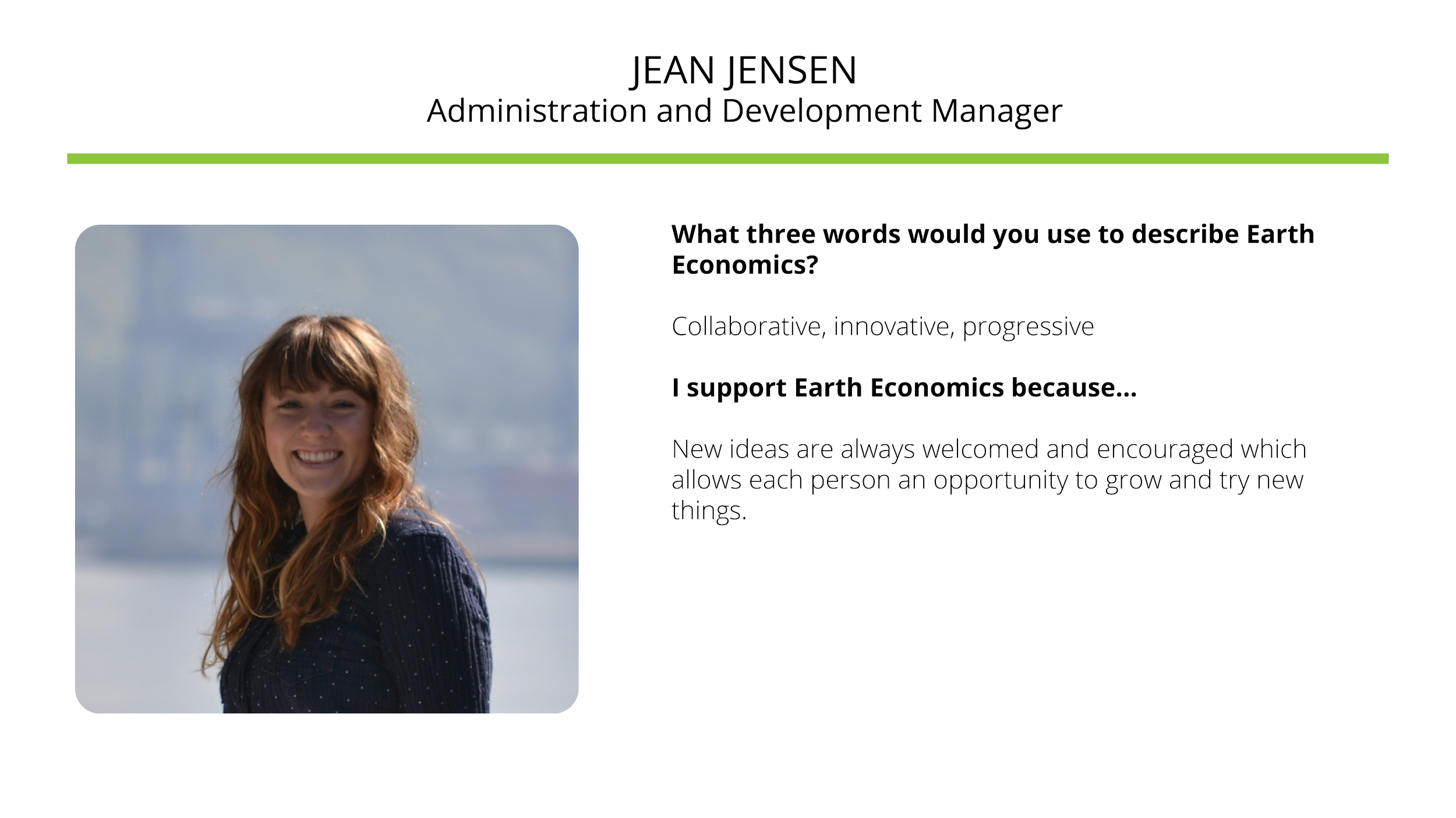
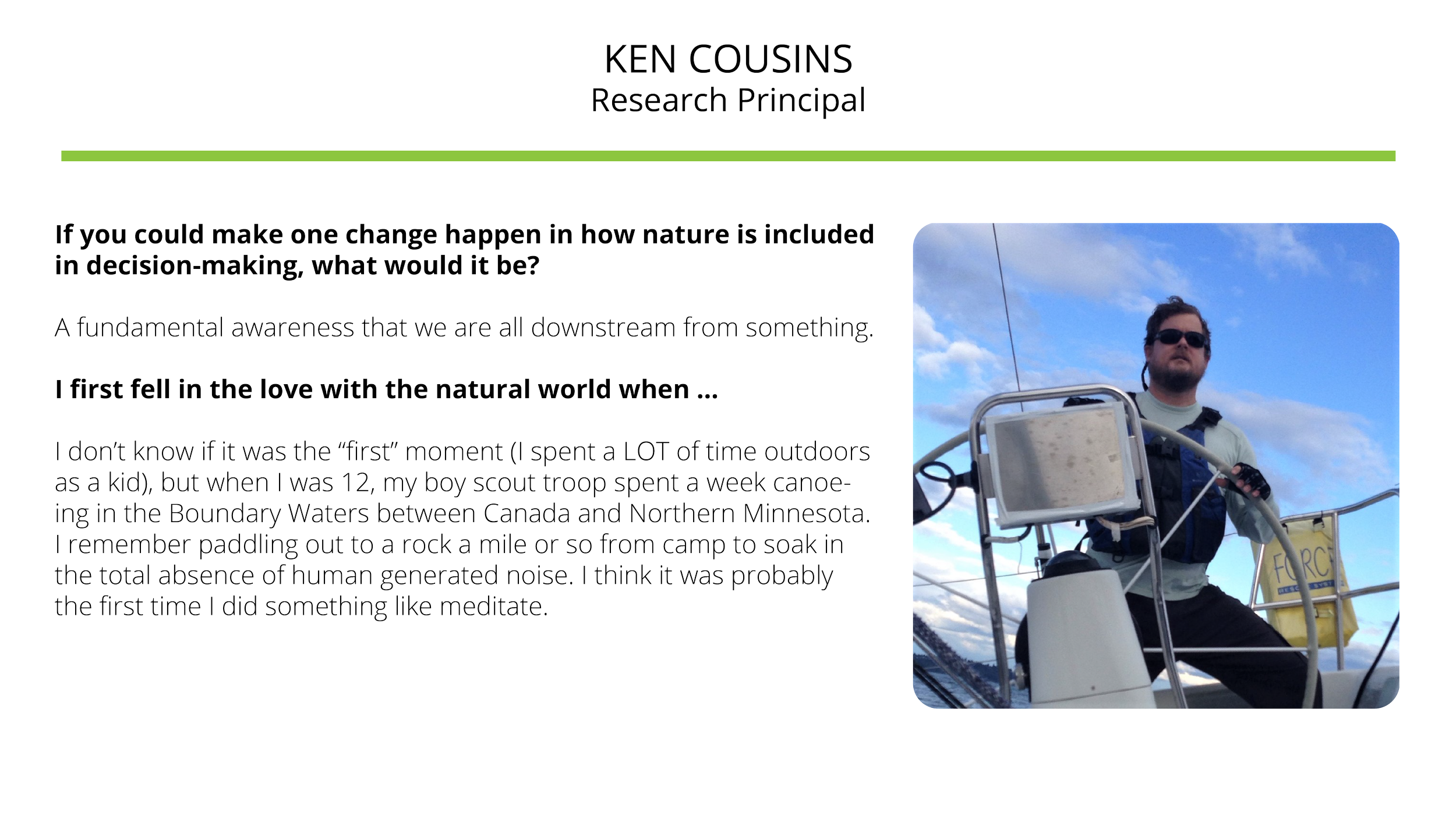
We’ve Moved!
In 2021, we also relocated to a shared co-working space in downtown Tacoma. With the transition to largely remote work, we strategically chose to reduce our impact and footprint by joining The Pioneer Collective for a sustainable workplace solution that fits our hybrid work model.
Our new mailing address is:
1102 A Street. STE 321
Tacoma, WA 98402
2021 Financials
Expenses $1,327,400
Revenue $1,553,859
Now and into the future, we’ll continue to innovate and stay true to our core work of raising awareness, providing robust natural capital analysis, and identifying policy solutions that work with nature. We’re confident in our vision of a better future where communities, nature, and industry all thrive together.
Thank you for your continued support.










